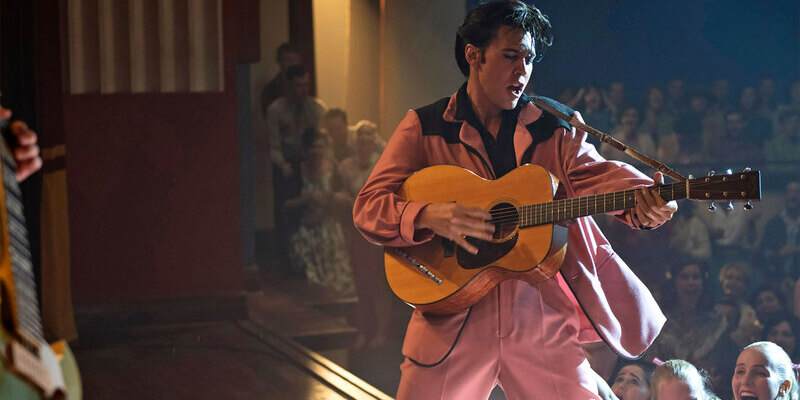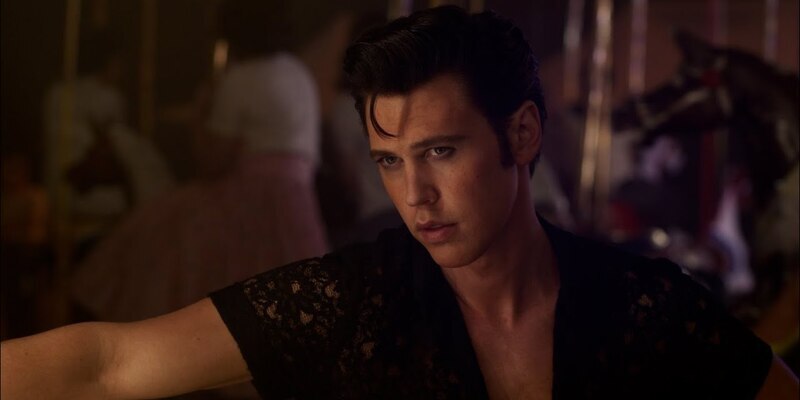
Review by
Eric Hillis
Directed by: Baz Luhrmann
Starring: Austin Butler, Tom Hanks, Helen Thomson, Richard Roxburgh, Olivia DeJonge, Luke Bracey, Natasha
Bassett, David Wenham, Kelvin Harrison Jr., Xavier Samuel, Kodi
Smit-McPhee

When John Carpenter was tasked with directing a biopic of Elvis Presley
soon after the singer's passing, he wisely understood that John Carpenter
wasn't bigger than Elvis, and so he delivered a scaled down, intimate look
at the life of the American icon. I suspect Baz Luhrmann is more in
line with John Lennon, believing himself not just bigger than Elvis, but
bigger than God. In his Elvis biopic, simply titled Elvis, the king of rock 'n roll comes second to Luhrmann's tiresome visual
style, an exhausting amalgam of Michael Bay and '90s Oliver Stone that
always seem to want to get to the next scene before we have time to digest
the scene we're currently watching.
Luhrmann's film focusses heavily on Elvis's notorious manager, Colonel
Tom Parker, played here by Tom Hanks in a fat suit. It's a career
nadir for Hanks, who narrates the life of Elvis in a bizarre European
accent that certainly doesn't sound like a Dutchman. Luhrmann appears to
take inspiration from Stone's Nixon biopic with this device, as the
movie's antagonist pleads with the audience for understanding. Perhaps
there's something interesting about a foreigner going to America and
living the capitalist American dream only to find himself one of the most
hated men in America, but it's something Luhrmann isn't interested
in.

With references to the turmoil of America in the mid 20th century, the
movie dabbles in shallow politics inserted for some unlikely drama. Elvis
watches the news about the assassinations of Martin Luther King Jr and
Bobby Kennedy and mumbles about how it's a shame and perhaps he should try
to heal America through his music. This puts him at odds with Parker, who
wants to keep his boy apolitical. Sorry, is this a biopic of Elvis or
Woody Guthrie? There's a sequence around the 1968 comeback special that
literally rehashes a segment from Hal Ashby's excellent Guthrie biopic
Bound for Glory, with Elvis defying a TV network to deliver his message. None of it
makes any sense here though, as it's a massive production that was filmed
over several days so there's no way the network didn't know what they were
getting into.
Played by Austin Butler, who doesn't look so much like Elvis as
like his Madame Tussaud's wax figure, Elvis is mostly a one-note victim
here, the Pinocchio to Parker's sinister Geppetto. That may be true to
life to some degree but I'm not sure it's how anyone wants to remember
Elvis, and it makes for a depressing second half of the movie that no
amount of Luhrmann's histrionics can wash over.

Butler does a good job with what he's given, but he's not given a whole
lot. Howard Hawks famously said that a good movie has three good scenes
and no bad one. Elvis has three good scenes and dozens of
bad ones, and it's no surprise that those three good scenes feature Elvis
performing on stage. With his shaking hips and swagger, we're left in no
doubt as to why the teenagers of the world fell under the singer's
spell.
Commendably, Luhrmann reminds us that Elvis was preceded by many black
singers who didn't receive anywhere near the same level of recognition. As
Elvis launches into one of his hits, Luhrmann will flash back to a blues
singer performing the song a decade earlier to a tiny audience in a bar or
alone in a barn. But there's something off about how Luhrmann fetishises
African-Americans here, and I have no idea why he chose to score scenes
set in the black part of Memphis with modern hip-hop. There's one very
strange scene where Elvis discovers Little Richard in a small bar in 1958,
three years after that singer scored his first trans-Atlantic hit with
Tutti Frutti. How could Elvis not have been aware of Little Richard
(played by Alton Mason as a proto-Prince) at that point?

Luhrmann's film is an autopsy of American pop culture performed by a
drunk butcher with a bonesaw. The only thing that's all shook up here is
the timeline, with Sharon Tate being murdered on the same night as the
infamous Rolling Stones concert at Altamont and Elvis not beginning his
movie career until he returns from military service. It's difficult to
tell what stage of Elvis's life we're currently watching, as he never puts
on weight until a closing scene that sees Butler don a fat suit that makes
him look like a supporting character in a Mike Myers comedy. Perhaps
what's most disappointing about Elvis is how we never once
see the great man eating. One of history's great eaters and we don't see
so much as a peanut butter and banana sandwich pass his lips. Desperate
not to portray Elvis in any negative light, the movie is deceptive in its
failure to mention the love of his life, Priscilla (Olivia De Jonge), was 14 when they began courting.
In many ways Luhrmann's Elvis biopic plays like the Stars on 45 version
of Carpenter's earlier film. It takes practically the same plotline and
adds mechanical beats and a coke-fuelled refusal to examine anything in
detail. The best scene in Carpenter's film sees him simply place his
camera in front of Kurt Russell's Elvis as he performs Suspicious Minds in
his Graceland living room, surrounded by an entourage of friends and
exploiters. I think this is how Elvis fans want to remember their idol, as
a man with a voice that had to be heard, but Luhrmann is only interested
in the surface spangles.

